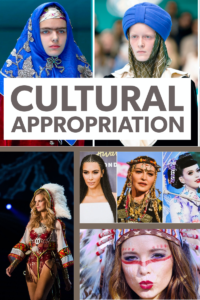What is Cultural Appropriation?
Cultural appropriation refers to the act of borrowing, imitating, or adopting elements of one culture by members of another culture, typically without understanding or respecting the cultural significance, history, or context of those elements. This often occurs when elements of a dominant or privileged culture are taken from a marginalized or oppressed culture. Cultural appropriation can encompass various aspects, including fashion, language, symbols, rituals, music, art, and other cultural expressions. Cultural Appropriation involves the commodification or misrepresentation of cultural elements, perpetuates stereotypes, disrespects or distorts the original culture, and contributes to the erasure of the contributions and experiences of the culture being appropriated.
What is Cultural Appreciation?
Cultural appreciation, as opposed to cultural appropriation, involves a genuine and respectful interest in, understanding of, and engagement with elements of a culture different from one’s own. It centers on the concept of consent by recognizing the importance of obtaining permission, participating with respect, and valuing the contributions of the culture being appreciated.
Here are some key aspects of cultural appreciation and how it centers consent:
- Respectful Learning: Cultural appreciation starts with a genuine desire to learn and understand the cultural practices, traditions, and expressions of another group. It often involves seeking out knowledge from authentic sources, engaging with members of that culture, and being open to education and guidance.
- Consent through Collaboration: Cultural appreciation often involves collaboration and exchange. Consent is central to this process because individuals from the culture being appreciated are actively participating and sharing their culture willingly. This collaboration can lead to a more meaningful and authentic experience for all parties involved.
- Acknowledging Origins: People who engage in cultural appreciation recognize and acknowledge the origins and significance of the cultural elements they are interacting with. They understand the history and context, and they give credit to the culture for its contributions.
- Avoiding Stereotypes and Generalizations: Cultural appreciation avoids perpetuating stereotypes or making broad generalizations about the culture being explored. It recognizes that cultures are diverse and multifaceted, and individuals should not make assumptions based on limited exposure or understanding.
- Ethical Use: When cultural elements are used in various contexts, such as fashion, art, or music, individuals practicing cultural appreciation do so ethically and with permission when necessary. This may involve purchasing items from artisans or respecting copyright and intellectual property rights.
- Active Listening and Open Dialogue: Cultural appreciation encourages active listening and open dialogue with members of the culture. It values their voices and perspectives, and it welcomes discussions that foster mutual understanding and respect.
- Avoiding Exploitation: Consent in cultural appreciation ensures that the culture being explored is not exploited for personal gain or commercial purposes. It respects the autonomy and agency of the culture’s practitioners.
- Self-Reflection: Those engaged in cultural appreciation often engage in self-reflection to examine their own motivations, biases, and privileges. They understand the importance of their own position in the process and work to minimize the harm they may unintentionally cause.
It is important to note that cultural exchange and appreciation are different from cultural appropriation. Cultural exchange involves a mutual sharing and respect for each other’s cultures, whereas cultural appropriation involves a power dynamic that can lead to exploitation and harm. It’s essential to be culturally sensitive and respectful when engaging with elements from other cultures.

